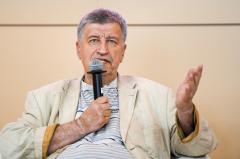Emirati And Russian Researchers Discuss Arabic Influence On Russian Orientals

A panel discussion titled ‘Russian Orientalists and Arab History’, was organised as part of Sharjah’s activities as ‘Guest City’ at the Moscow International Book Fair 2019 (MIBF). Held at the Sharjah pavilion, the panelists included Dr Hamad Bin Saray, Associate Professor of Ancient History at the faculty of Humanities and Social Sciences, UAE University; and Dmitry Mikulski, researcher at the Institute of Oriental Studies of the Russian Academy of Sciences and moderated by poet Sheikha Al Mutairi.
The panelists focused on the Russian interest in Arabic culture, and the efforts to document the political atmosphere. Bin Saray highlighted several studies done by Russian Orientals who had documented the Arabic region accurately. He also noted the Russian interest in Arabs, pre- as well as post Islam.
For his part, Mikulski answered the question why Russian Orientals had been honest in their research on Arabs, by saying: ‘Many factors contributed to this, most notably that Russia did not have colonial ambitions in the Arab region, and that Russians saw Arabs as brothers against the Turks and the Ottoman Empire. Also, Russia before the end of the Tsar regimes had operated in an imperial manner, working on extending its reach through alliances far and wide.”
He noted that to date, Russian researchers were still discovering Arabic coins dating back to the Abbasid era in Russian territory. He said that the Abbasid currency had been in use globally during that era.
He pointed out that this relationship between Russia and the Arab world had not included scientific studies and research, which had come at a later stage, and noted that Russia had celebrated the 200th anniversary of Orientalism in 2018.
Mikulski added that before studies in Orientalism, the Russian-Arab relations had gone through many stages, most notably during the reign of Catherine the Great. He said that she had understood the importance of Islam and had formed an independent entity to manage Muslim affairs. She had enabled the construction of mosques and publishing a translated version of the Holy Quran. He said that during her reign, one of the most important publishing houses that produced Arabic content had been based in the city of Kazan.


